冀教版八上英语 Unit 1 Me and My Class Review 课件(共20张PPT)
文档属性
| 名称 | 冀教版八上英语 Unit 1 Me and My Class Review 课件(共20张PPT) | 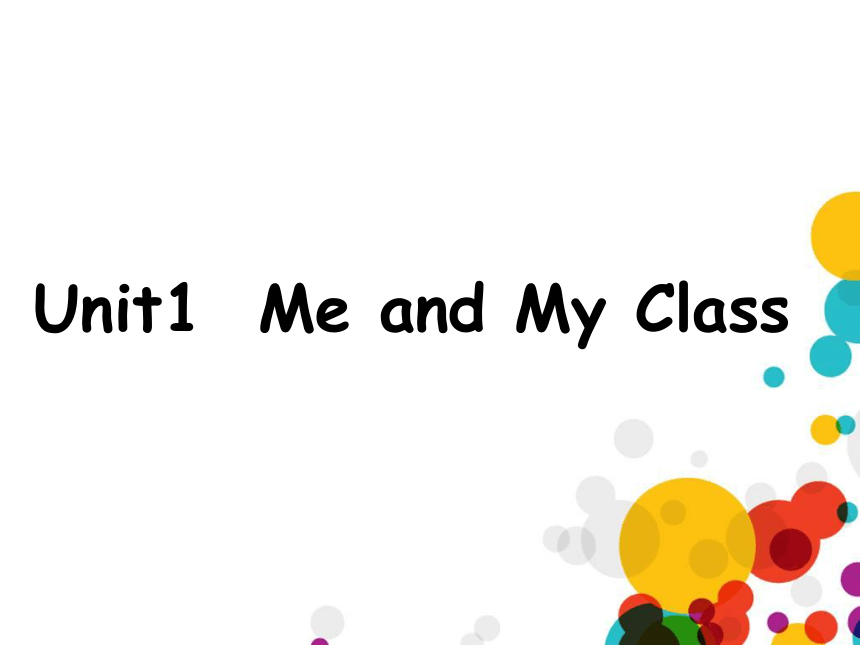 | |
| 格式 | ppt | ||
| 文件大小 | 322.5KB | ||
| 资源类型 | 教案 | ||
| 版本资源 | 冀教版 | ||
| 科目 | 英语 | ||
| 更新时间 | 2022-12-04 08:11:52 | ||
图片预览

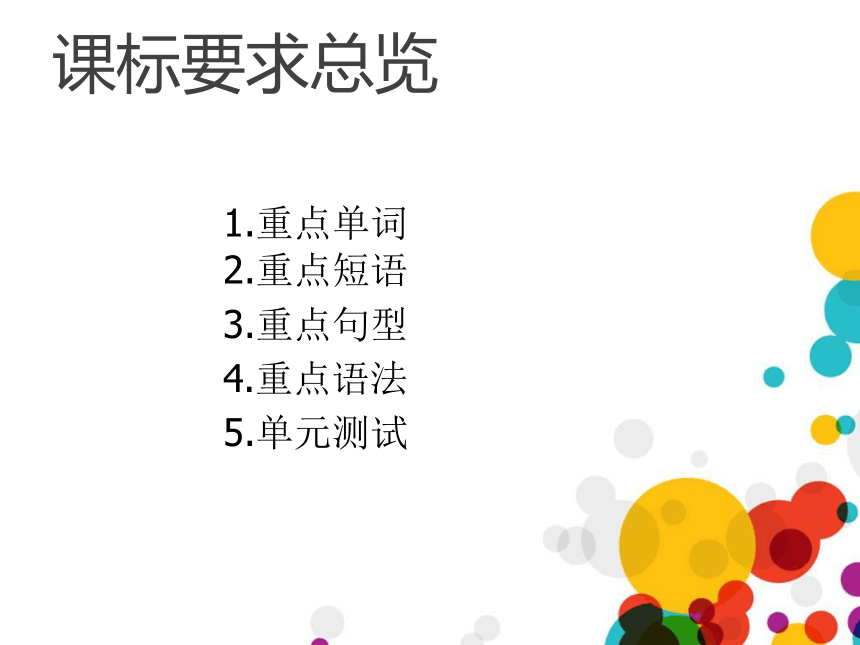
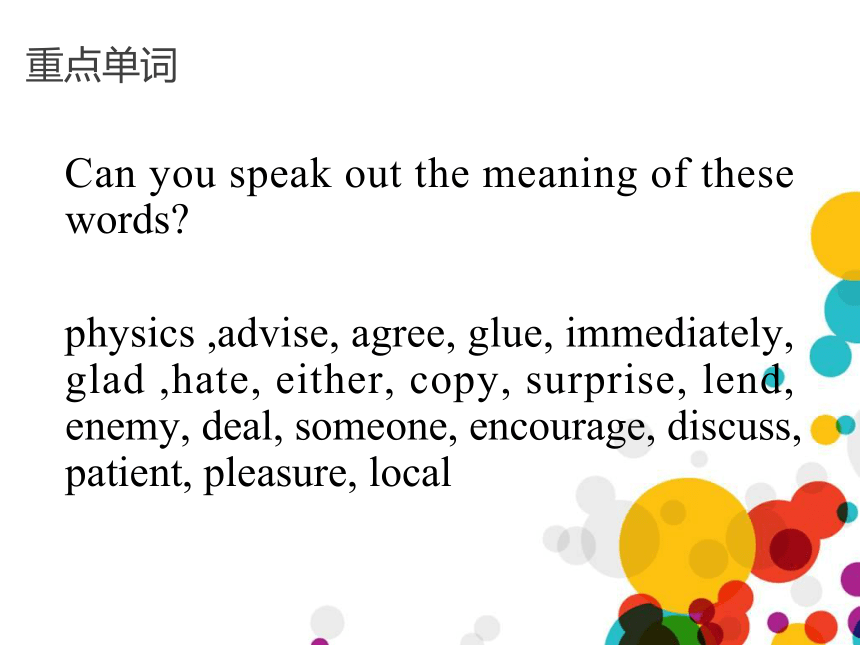
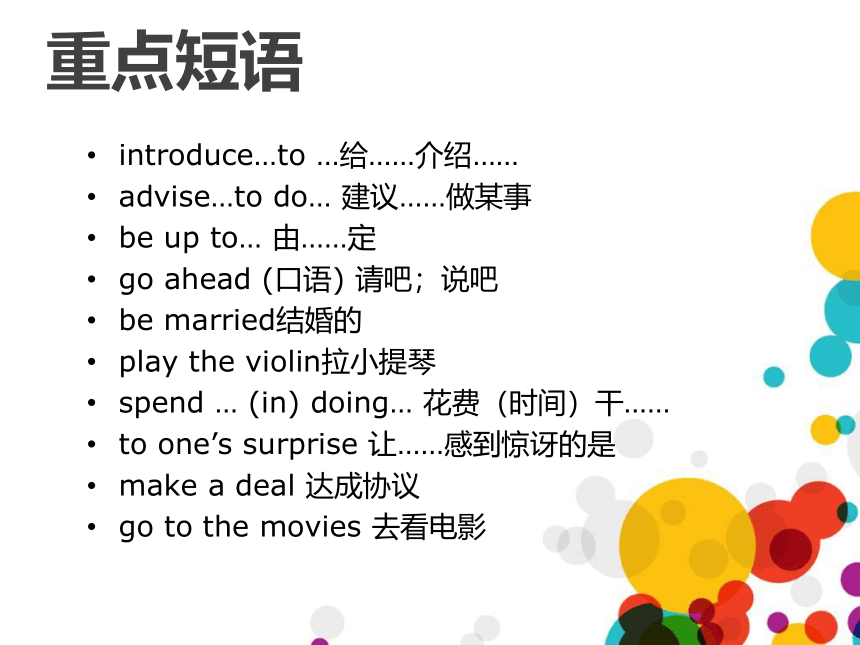
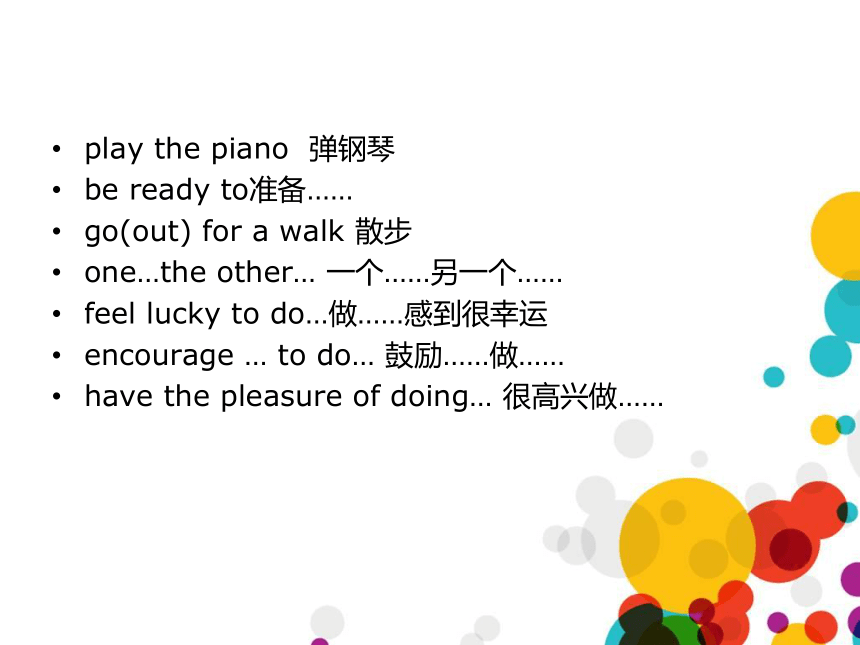
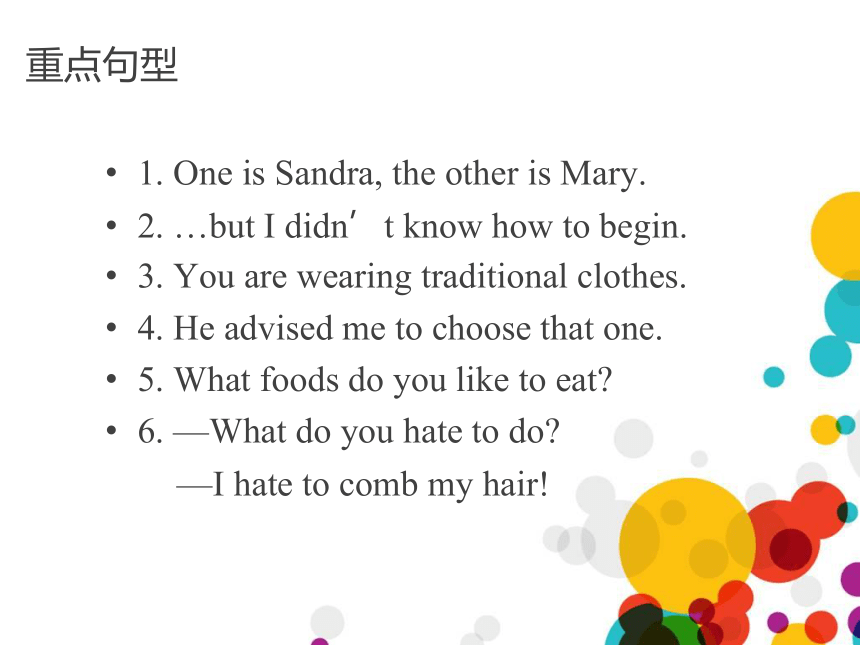
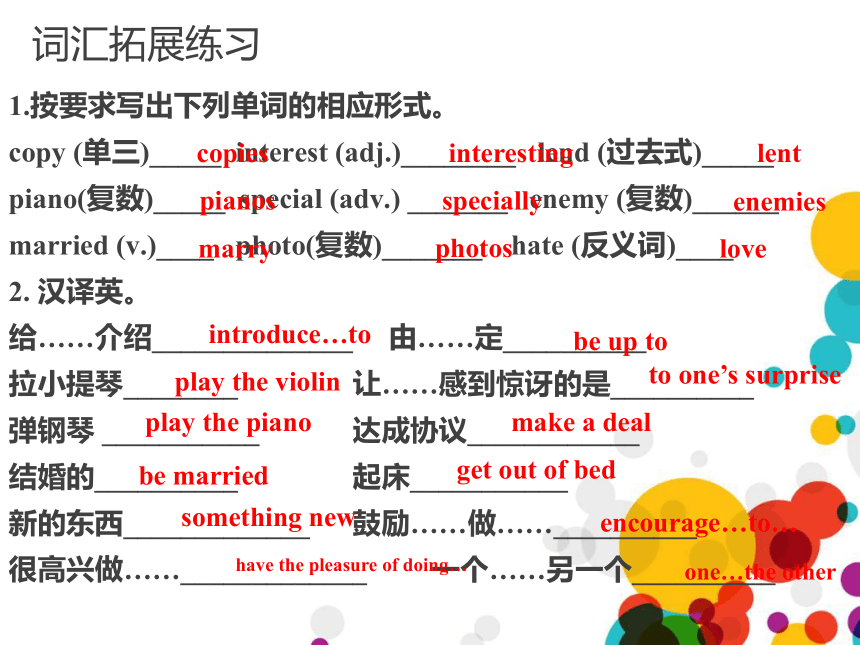

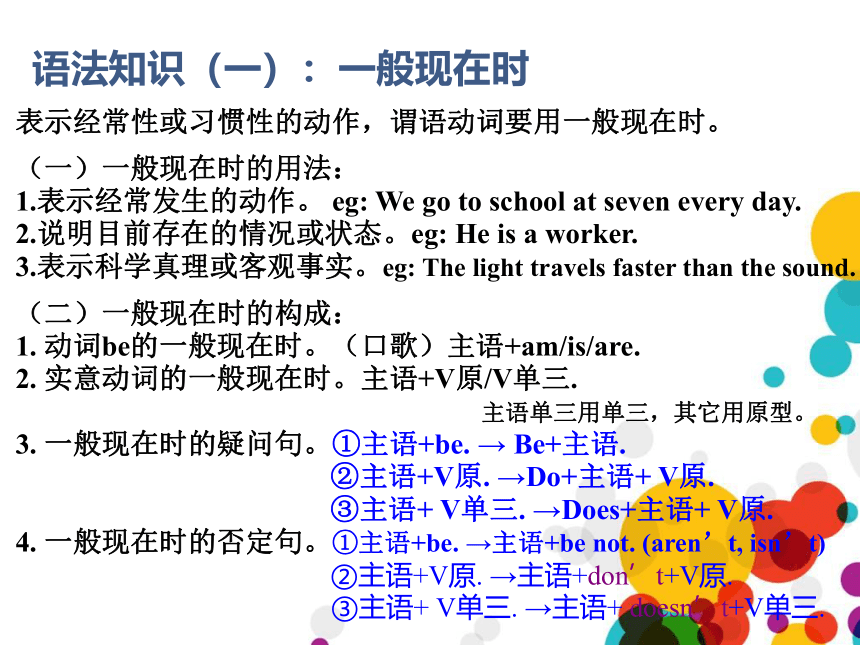
文档简介
(共20张PPT)
Unit1 Me and My Class
课标要求总览
1.重点单词
2.重点短语
3.重点句型
4.重点语法
5.单元测试
重点单词
Can you speak out the meaning of these words
physics ,advise, agree, glue, immediately, glad ,hate, either, copy, surprise, lend, enemy, deal, someone, encourage, discuss, patient, pleasure, local
重点短语
introduce…to …给……介绍……
advise…to do… 建议……做某事
be up to… 由……定
go ahead (口语) 请吧;说吧
be married结婚的
play the violin拉小提琴
spend … (in) doing… 花费(时间)干……
to one’s surprise 让……感到惊讶的是
make a deal 达成协议
go to the movies 去看电影
play the piano 弹钢琴
be ready to准备……
go(out) for a walk 散步
one…the other… 一个……另一个……
feel lucky to do…做……感到很幸运
encourage … to do… 鼓励……做……
have the pleasure of doing… 很高兴做……
重点句型
1. One is Sandra, the other is Mary.
2. …but I didn’t know how to begin.
3. You are wearing traditional clothes.
4. He advised me to choose that one.
5. What foods do you like to eat
6. —What do you hate to do
—I hate to comb my hair!
词汇拓展练习
1.按要求写出下列单词的相应形式。
copy (单三)_____ interest (adj.)________ lend (过去式)_____
piano(复数)_____ special (adv.) _______ enemy (复数)______
married (v.)____ photo(复数)_______ hate (反义词)____
2. 汉译英。
给……介绍______________ 由……定__________
拉小提琴________ 让……感到惊讶的是__________
弹钢琴 ___________ 达成协议____________
结婚的__________ 起床___________
新的东西_____________ 鼓励……做……__________
很高兴做……_____________ 一个……另一个__________
copies
interesting
lent
pianos
specially
enemies
marry
photos
love
introduce…to
be up to
have the pleasure of doing…
play the violin
to one’s surprise
play the piano
make a deal
be married
get out of bed
one…the other
something new
encourage…to…
完成下列句子。
1.上星期天我们花了大量的时间练习讲英语。
We spent _________ ________ English last Sunday.
2.男孩周末喜欢穿牛仔裤。
Boys like _______ jeans on weekend.
3我在读书中寻求到快乐。
I had the ________ of reading books.
4.丹尼向我们介绍了他的新朋友。
Danny__________his new friends____ us.
5.他父母不喜欢吃面条,他也不喜欢吃。
His parents don’t like noodles, he______ _____ noodles, _____ .
6.他不再穿这条长裤了。
He _____ _____ the pair of the pants ___ _____.
7.我很高兴帮助你。 I ___ ____ ___ help you.
8.爸爸给我买了一辆新自行车。
My father _______a new bicycle ______me.
重点句型练习
practicing speaking
wearing
pleasure
either
introduced
to
doesn’t like
won’t wear
any more
am happy to
for
bought
语法知识(一):一般现在时
表示经常性或习惯性的动作,谓语动词要用一般现在时。
(一)一般现在时的用法:
1.表示经常发生的动作。 eg: We go to school at seven every day.
2.说明目前存在的情况或状态。eg: He is a worker.
3.表示科学真理或客观事实。eg: The light travels faster than the sound.
(二)一般现在时的构成:
1. 动词be的一般现在时。(口歌)主语+am/is/are.
2. 实意动词的一般现在时。主语+V原/V单三.
主语单三用单三,其它用原型。
3. 一般现在时的疑问句。①主语+be. → Be+主语.
②主语+V原. →Do+主语+ V原.
③主语+ V单三. →Does+主语+ V原.
4. 一般现在时的否定句。①主语+be. →主语+be not. (aren’t, isn’t)
②主语+V原. →主语+don’t+V原.
③主语+ V单三. →主语+ doesn’t+V单三.
语法知识(二):句子的四种基本结构
第1种 S+V We work. (不及物)
第2种 S+V+O He plays (及物) the piano.
此种结构中,有些不及物动词后面加上介词就可把它看成一个及物动词,后面就可以加宾语了。如:
You must listen to me. 你必须听我的。
(listen是不及物动词。但加上to之后,listen to可以看成一个及物动词。)
第4种 S+V+IO+DO She gave(及物) me a pen.
常带双宾语(直接宾语和间接宾语)的动词(分为A、B两类):
A:动词后加to:
give 给 show给……看 send寄,打电报 bring带…… read读…… pass递给…… lend借给…… leave留给…… hand交给…… tell告诉…… return归还 write给…写信
B: 动词后加for:
buy给/为某人买… draw 替/给某人画… make 为某人制作…
第3种 S+V+P We are(系动词) students.
表语通常是名词或形容词等。
常见系动词:be是,keep保持, look看起来,feel觉得,smell 闻起来, sound 听起来, taste 尝起来,become/grow/get/go/turn 变得
5.S+V+O+C
Books make(及物) us happy.
如果宾语与其后的成分存在逻辑上的主谓或主表关系,则该动词后面接的是复合宾语,否则就是双宾语。
语法针对性练习
一、用所给词的适当形式填空。
1.My brother (not like) watching TV.
2.They (come) frome America.They (not speak) French.
3.She often (wash) clothes herself.
4. he (have) a dictionary
二、句型转换。
1.We do morning exercises every morning.(否定句)
We morning exercises every morning.
2. He always comes to school late.(一般疑问句)
he always to school late.
3. He never goes to work by bike.(改为肯定句)
He to work by bike.
doesn’t like
come
don’t speak
washes
Does
have
don’t do
Does
come
goes
请判断下列句子的结构类型。
1. He is running.
2. The little boy is asking the teacher all kinds of questions.
3. She seemed angry.
4. My father bought me a beautiful present.
主语---动词---间接宾语---直接宾语
主语---动词----表语
主语---动词
主语---动词---间接宾语---直接宾语
5. You should keep the classroom clean and tidy.
主语---动词---宾语---宾语补足语
单元达标测验题
一、选择与划线部分意思相同或相近的选项。
1. ( )The students go to school at 7:00.
A. child B. pupils C. boys D. girl
2. ( )They are wearing uniforms at work.
A. in B. on C. put on D. taking off
3. ( )People hate clothes made of fiber(化纤).
A. love B. dislikes C. like to wear D. don’t like
B
A
D
二、单项选择。
1. ( )You’d better not read today’s newspaper because there is ___ in it.
A. something interesting B. anything new
C. important thing D. nothing special
2. ( )Do you enjoy ___ in China
A. living B. to live C. live D. lives
D
A
3. ( )It’s getting dark, ___ they’re still working.
A. and B. but C. so D. or
4. ( )—Your sweater looks nice. Is it ___ wool
—Yes, and it’s ___ Inner Mongolia.
A. made of; made by B. made of; made in
C. made by; made of D. made by; made from
5. ( )We are always ready ___ others.
A. to helping B. to help C. help D. helping
B
B
B
6. ( )—May I help you with some jeans, sir
—Yes, I’d like to try on those blue ___.
A. pair B. one C. two D. ones
7. ( )—How many more oranges can I have
—One more. ___ are for Tom.
A. The others B. Another
C. Others D. The other
8. ( )He was happy ___ your e-mail.
A. see B. to see C. seeing D. saw
D
A
B
9. ( )She wants ___ come to her birthday party.
A. invited he to B. invited him to
C. to invite him D. to invite him to
10. ( )He likes playing ___ violin, but dislikes playing ___ football.
A. the; the B. / ; the C. the; / D. / ; /
D
C
Unit1 Me and My Class
课标要求总览
1.重点单词
2.重点短语
3.重点句型
4.重点语法
5.单元测试
重点单词
Can you speak out the meaning of these words
physics ,advise, agree, glue, immediately, glad ,hate, either, copy, surprise, lend, enemy, deal, someone, encourage, discuss, patient, pleasure, local
重点短语
introduce…to …给……介绍……
advise…to do… 建议……做某事
be up to… 由……定
go ahead (口语) 请吧;说吧
be married结婚的
play the violin拉小提琴
spend … (in) doing… 花费(时间)干……
to one’s surprise 让……感到惊讶的是
make a deal 达成协议
go to the movies 去看电影
play the piano 弹钢琴
be ready to准备……
go(out) for a walk 散步
one…the other… 一个……另一个……
feel lucky to do…做……感到很幸运
encourage … to do… 鼓励……做……
have the pleasure of doing… 很高兴做……
重点句型
1. One is Sandra, the other is Mary.
2. …but I didn’t know how to begin.
3. You are wearing traditional clothes.
4. He advised me to choose that one.
5. What foods do you like to eat
6. —What do you hate to do
—I hate to comb my hair!
词汇拓展练习
1.按要求写出下列单词的相应形式。
copy (单三)_____ interest (adj.)________ lend (过去式)_____
piano(复数)_____ special (adv.) _______ enemy (复数)______
married (v.)____ photo(复数)_______ hate (反义词)____
2. 汉译英。
给……介绍______________ 由……定__________
拉小提琴________ 让……感到惊讶的是__________
弹钢琴 ___________ 达成协议____________
结婚的__________ 起床___________
新的东西_____________ 鼓励……做……__________
很高兴做……_____________ 一个……另一个__________
copies
interesting
lent
pianos
specially
enemies
marry
photos
love
introduce…to
be up to
have the pleasure of doing…
play the violin
to one’s surprise
play the piano
make a deal
be married
get out of bed
one…the other
something new
encourage…to…
完成下列句子。
1.上星期天我们花了大量的时间练习讲英语。
We spent _________ ________ English last Sunday.
2.男孩周末喜欢穿牛仔裤。
Boys like _______ jeans on weekend.
3我在读书中寻求到快乐。
I had the ________ of reading books.
4.丹尼向我们介绍了他的新朋友。
Danny__________his new friends____ us.
5.他父母不喜欢吃面条,他也不喜欢吃。
His parents don’t like noodles, he______ _____ noodles, _____ .
6.他不再穿这条长裤了。
He _____ _____ the pair of the pants ___ _____.
7.我很高兴帮助你。 I ___ ____ ___ help you.
8.爸爸给我买了一辆新自行车。
My father _______a new bicycle ______me.
重点句型练习
practicing speaking
wearing
pleasure
either
introduced
to
doesn’t like
won’t wear
any more
am happy to
for
bought
语法知识(一):一般现在时
表示经常性或习惯性的动作,谓语动词要用一般现在时。
(一)一般现在时的用法:
1.表示经常发生的动作。 eg: We go to school at seven every day.
2.说明目前存在的情况或状态。eg: He is a worker.
3.表示科学真理或客观事实。eg: The light travels faster than the sound.
(二)一般现在时的构成:
1. 动词be的一般现在时。(口歌)主语+am/is/are.
2. 实意动词的一般现在时。主语+V原/V单三.
主语单三用单三,其它用原型。
3. 一般现在时的疑问句。①主语+be. → Be+主语.
②主语+V原. →Do+主语+ V原.
③主语+ V单三. →Does+主语+ V原.
4. 一般现在时的否定句。①主语+be. →主语+be not. (aren’t, isn’t)
②主语+V原. →主语+don’t+V原.
③主语+ V单三. →主语+ doesn’t+V单三.
语法知识(二):句子的四种基本结构
第1种 S+V We work. (不及物)
第2种 S+V+O He plays (及物) the piano.
此种结构中,有些不及物动词后面加上介词就可把它看成一个及物动词,后面就可以加宾语了。如:
You must listen to me. 你必须听我的。
(listen是不及物动词。但加上to之后,listen to可以看成一个及物动词。)
第4种 S+V+IO+DO She gave(及物) me a pen.
常带双宾语(直接宾语和间接宾语)的动词(分为A、B两类):
A:动词后加to:
give 给 show给……看 send寄,打电报 bring带…… read读…… pass递给…… lend借给…… leave留给…… hand交给…… tell告诉…… return归还 write给…写信
B: 动词后加for:
buy给/为某人买… draw 替/给某人画… make 为某人制作…
第3种 S+V+P We are(系动词) students.
表语通常是名词或形容词等。
常见系动词:be是,keep保持, look看起来,feel觉得,smell 闻起来, sound 听起来, taste 尝起来,become/grow/get/go/turn 变得
5.S+V+O+C
Books make(及物) us happy.
如果宾语与其后的成分存在逻辑上的主谓或主表关系,则该动词后面接的是复合宾语,否则就是双宾语。
语法针对性练习
一、用所给词的适当形式填空。
1.My brother (not like) watching TV.
2.They (come) frome America.They (not speak) French.
3.She often (wash) clothes herself.
4. he (have) a dictionary
二、句型转换。
1.We do morning exercises every morning.(否定句)
We morning exercises every morning.
2. He always comes to school late.(一般疑问句)
he always to school late.
3. He never goes to work by bike.(改为肯定句)
He to work by bike.
doesn’t like
come
don’t speak
washes
Does
have
don’t do
Does
come
goes
请判断下列句子的结构类型。
1. He is running.
2. The little boy is asking the teacher all kinds of questions.
3. She seemed angry.
4. My father bought me a beautiful present.
主语---动词---间接宾语---直接宾语
主语---动词----表语
主语---动词
主语---动词---间接宾语---直接宾语
5. You should keep the classroom clean and tidy.
主语---动词---宾语---宾语补足语
单元达标测验题
一、选择与划线部分意思相同或相近的选项。
1. ( )The students go to school at 7:00.
A. child B. pupils C. boys D. girl
2. ( )They are wearing uniforms at work.
A. in B. on C. put on D. taking off
3. ( )People hate clothes made of fiber(化纤).
A. love B. dislikes C. like to wear D. don’t like
B
A
D
二、单项选择。
1. ( )You’d better not read today’s newspaper because there is ___ in it.
A. something interesting B. anything new
C. important thing D. nothing special
2. ( )Do you enjoy ___ in China
A. living B. to live C. live D. lives
D
A
3. ( )It’s getting dark, ___ they’re still working.
A. and B. but C. so D. or
4. ( )—Your sweater looks nice. Is it ___ wool
—Yes, and it’s ___ Inner Mongolia.
A. made of; made by B. made of; made in
C. made by; made of D. made by; made from
5. ( )We are always ready ___ others.
A. to helping B. to help C. help D. helping
B
B
B
6. ( )—May I help you with some jeans, sir
—Yes, I’d like to try on those blue ___.
A. pair B. one C. two D. ones
7. ( )—How many more oranges can I have
—One more. ___ are for Tom.
A. The others B. Another
C. Others D. The other
8. ( )He was happy ___ your e-mail.
A. see B. to see C. seeing D. saw
D
A
B
9. ( )She wants ___ come to her birthday party.
A. invited he to B. invited him to
C. to invite him D. to invite him to
10. ( )He likes playing ___ violin, but dislikes playing ___ football.
A. the; the B. / ; the C. the; / D. / ; /
D
C
同课章节目录
- Unit 1 Me and My Class
- Lesson 1 Back to School!
- Lesson 2 Many Faces, One Picture
- Lesson 3 Getting to Know You!
- Lesson 4 Best Friends
- Lesson 5 Meet Ms. Liu
- Lesson 6 Jenny's Week
- Unit 2 My Favourite School Subject
- Lesson 7 Don't Be Late for Class!
- Lesson 8 E-mail Helpers!
- Lesson 9 I Don't Want to Miss Geography !
- Lesson 10 Looking for Lisa
- Lesson 11 Lily Learns about China !
- Lesson 12 Karen's Hair Stood Up!
- Unit Review
- Unit 3 Families Celebrate Togethe
- Lesson 13 I Love Autumn
- Lesson 14 Happy Memories
- Lesson 15 A Present for Li Ming!
- Lesson 16 Happy Thanksgiving!
- Lesson 17 Presents from Canada!
- Lesson 18 Li Ming's Birthday
- Unit Review
- Unit 4 My Neighbourhood
- Lesson 19 The Best Neighourhood
- Lesson 20 No Stopping!
- Lesson 21 Eat a Donut and Turn Right
- Lesson 22 I Like My Neighbourhood
- Lesson 23 People in My Neighbourhood
- Lesson 24 I Need a Map!
- Unit Review
- Unit 5 My Future
- Lesson 25 I Want to Be a Teacher!
- Lesson 26 What Will I Be ?
- Lesson 27 What's Your Advice?
- Lesson 28 Rich or Poor? It Doesn't Matter!
- Lesson 29 Our Ambitions and Dreams
- Lesson 30 A Famous Friend?
- Unit Review
- Unit 6 Go With Transportation !
- Lesson 31 How Do You Travel ?
- Lesson 32 Trains Go Faster !
- Lesson 33 Life on Wheels
- Lesson 34 Flying Donuts
- Lesson 35 Future Transportation
- Lesson 36 Clean Cars ?
- Unit Review
- Unit 7 Enjoy Your Hobby
- Lesson 37 What's Your Hobby ?
- Lesson 38 Hobbies Are Fun!
- Lesson 39 Danny's Hobby
- Lesson 40 What's Paul's Hobby?
- Lesson 41 Show and Tell!
- Lesson 42 The New Club
- Unit Review
- Unit 8 Celebrating Me
- Lesson 43 What Makes You Unique?
- Lesson 44 Georgia Plays Basketball
- Lesson 45 Be Yourself !
- Lesson 46 My Dream
- Lesson 47 I Made It !
- Lesson 48 Li Ming's Report
- Unit Review
